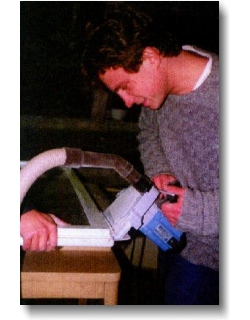

The International Energy Brigade (IEB) project is an innovative, community-based initiative designed to build the capacity of organisation already working on mitigating the economic, social and environmental impact of energy production and use to provide immediate relief for those most need in three countries (Bulgaria, Georgia, Hungary). The programme aims to influence energy policy and legislation in Central and Eastern Europe in favour of energy efficiency, to raise public awareness and NGO involvement in energy efficiency, to promote programmes, institutions, investments that favour sustainable energy alternatives, and to give practical examples of saving energy and reducing costs.
The vehicle for this work is the development and expansion of Hnuti DUHA’s (Friends of the Earth – Czech Republic) highly successful Clean Energy Brigades initiative to these three countries. This initiative involves the recruitment and training of brigades of volunteers to install simple low cost energy conservation technologies in low income and other marginalised households to reduce energy related cost and improve warmth and comfort.
The IEB Network will replicate the experience of Hnuti DUHA in Czech Republic, Bulgaria, Georgia and Hungary. Over two years, the network aims to insulate 120 public buildings (schools, orphans, hospitals…) and 3000 households in three countries. So 1000 households and 40 public buildings in Hungary.
The International Energy Brigades Network represents an innovative extension to and development of IIEC (International Institute for Energy Conservation)-Europe’s existing capacity building programme (CBP) in the Central and Eastern European region. This programme was set up in 1994 and now involves co-ordinators and programmes in five countries.
Current Situation in Hungary
In Hungary the increased cost of once heavily subsidised energy has added to the significant increase in the number of impoverished people and households. The increasingly larger proportion of family income needed to pay for energy for heating, cooking and washing has led to growing number of "fuel poor". This term refers to people and households who have insufficient resources to meet basic energy needs without impacting the basic needs elsewhere (e.g. food, clothes, rent etc.). Some 60-70 % of energy consumed in households in Hungary is used for heating. In this country the situation is compounded by houses poorly designed to keep out the cold and conserve heat. In Hungary it takes almost twice as much energy to heat homes to the same comfort levels as a well insulated home in Scandinavia. There is also present a lack of knowledge at government and household levels on the techniques and benefits of energy efficiency which inhibits practical responses to the above problems. In Hungary two public surveys on energy conservation (attitudes, practices) in 1997 conducted by European Union – PHARE program and Dutch SCORE program respectively, revealed that the public has a deficit of useful information on energy efficiency measures for households, and that more practical face to face advice and demonstrations are needed. In addition, the majority of respondents viewed independent and NGO advice centres as the most credible sources of advice and information for energy issues.
For further information contact Hajni Fehér: feherhaj@freemail.c3.hu
